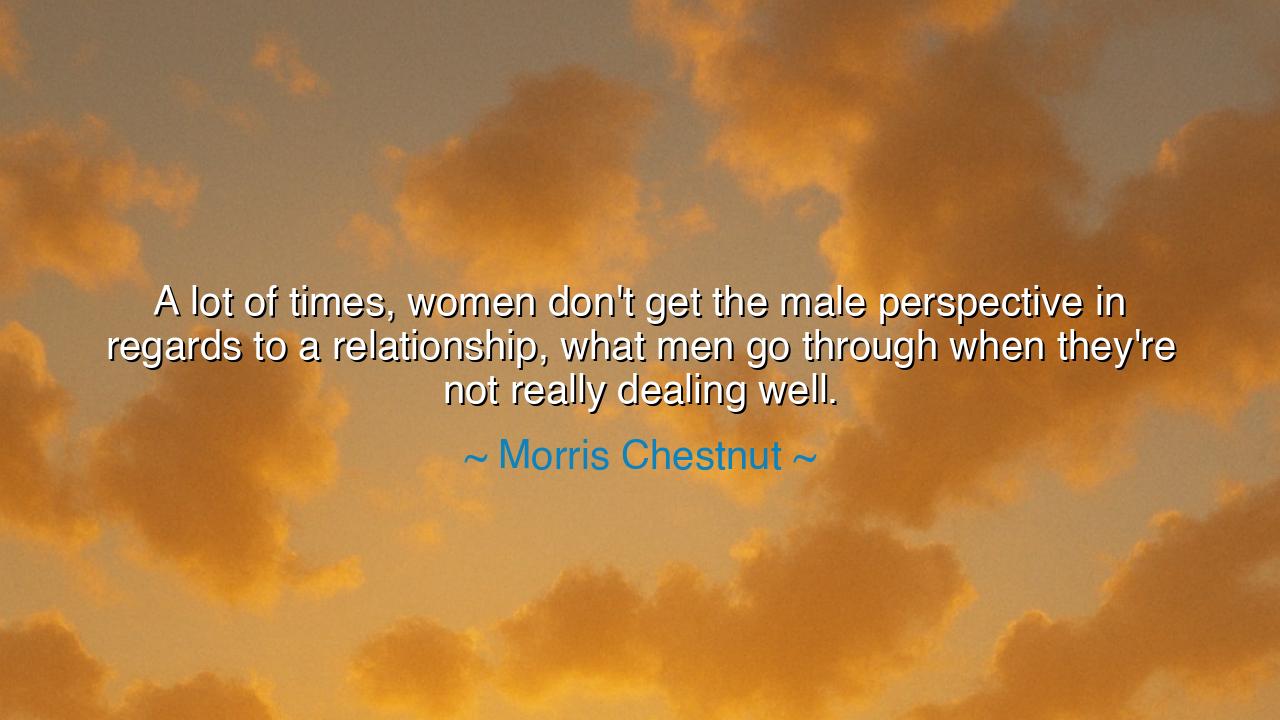
A lot of times, women don't get the male perspective in regards
A lot of times, women don't get the male perspective in regards to a relationship, what men go through when they're not really dealing well.






The words of Morris Chestnut, “A lot of times, women don’t get the male perspective in regards to a relationship, what men go through when they’re not really dealing well,” open a rare window into the hidden realm of the masculine heart. In this reflection, Chestnut does not speak as an actor or celebrity, but as a witness to one of the quietest struggles of our age—the struggle of men to express their pain, to reveal the unseen storms that shape their emotions when love and life weigh heavily upon them. His words remind us that misunderstanding between men and women often does not arise from malice, but from silence—from the unspoken feelings that lie buried beneath pride, duty, or fear.
At its core, this quote is a meditation on emotional invisibility. Chestnut suggests that men, when they suffer, do not easily show it. The world has long taught them to be strong, unyielding, and composed—to carry burdens alone, even when they are crumbling inside. Women, often more open in their communication, may misread this silence as indifference, when in truth it is a mask worn out of habit and expectation. Thus, love falters not because it fades, but because one heart cannot see the other clearly. The tragedy of misunderstanding is not born of cruelty, but of the limits we place on vulnerability.
The ancients understood this paradox well. The philosopher Epictetus, himself a Stoic, taught men to control their emotions, but even he warned that repression without understanding leads to bitterness. Likewise, Homer’s Achilles, the mightiest of warriors, could slay armies yet wept openly for his fallen friend Patroclus. In that act, he revealed that true strength does not lie in suppression, but in honesty. Chestnut’s insight echoes this ancient wisdom: that the male perspective, though often silent, is no less tender or troubled. It suffers invisibly, yearning for recognition not as weakness, but as humanity.
In every age, the expectation of men to remain stoic has caused quiet suffering. Consider Prince Albert, the devoted husband of Queen Victoria. Though he loved deeply, he bore the pressures of royal life with a calm face, concealing his anxieties for the sake of duty. His death at forty-two, brought on by exhaustion and stress, left the Queen mourning not only her husband, but the man she had never fully understood in life—the one who bore his struggles without ever truly voicing them. His story, like Chestnut’s reflection, reminds us that men, too, need to be heard, seen, and understood, not only in their strength, but in their struggle.
Chestnut’s words also speak to the imbalance of emotional literacy between the sexes. Women are often raised to articulate feeling, to connect and console, while men are raised to act, to endure, to solve. When love falters, these differences become chasms: the woman may ask, “Why won’t you tell me what’s wrong?” while the man, drowning quietly, may answer, “I don’t know how.” This silence is not the absence of care, but the result of centuries of conditioning. To restore harmony, both must learn each other’s languages—she, to see in his silence the depth of his pain; he, to find courage in openness rather than in armor.
The lesson in Chestnut’s reflection is not one of blame, but of understanding and compassion. He calls upon us to look beyond appearances—to see that strength and struggle often live side by side. For the man who seems distant may in truth be wrestling with doubt, shame, or despair; and the woman who seeks connection may only need to know that his silence is not rejection, but reverence—a clumsy effort to protect her from his pain. When both learn to see with empathy rather than assumption, love becomes deeper, wiser, and more enduring.
So let this teaching be passed down: seek to know the unseen burdens of those you love. Whether man or woman, do not mistake silence for coldness, or composure for peace. Ask gently, listen deeply, and give space for truth to emerge without judgment. For as Morris Chestnut reminds us, understanding begins not with agreement, but with empathy. The strongest bonds are not forged in perfection, but in the courage to be honest in one’s weakness and to receive another’s vulnerability with grace. When both hearts see each other in full—beyond pride, beyond pretense—then love, at last, becomes whole.






AAdministratorAdministrator
Welcome, honored guests. Please leave a comment, we will respond soon